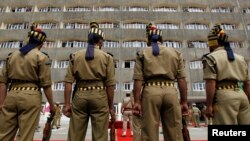SRINAGAR, JAMMU AND KASHMIR, INDIA —
Government officials in India's Kashmir are gearing up for the bi-annual 'capital shifting' that involves the transfer of the seat of the state government, including the civil secretariat and other offices, to the winter capital, Jammu, from the summer capital, Srinagar.
The bi-annual practice of moving the 'Darbar' (secretariat) between the two capital cities of the state, Srinagar and Jammu, has been inherited from the period of Dogra rule, which dates back to the 19th century.
It is estimated that the whole exercise of relocating offices costs the government over $520,000 every year.
The civil secretariat will open in Jammu on November 5.
“At the moment all the documents from the Srinagar secretariat are being loaded into trucks and other vehicles to be transported to Jammu. All this will be reopened in Jammu. This durbar move is an age old tradition and is done bi-annually. Six months the secretariat is in Srinagar and six months in Jammu,” said Sajjad Ahmad, a government employee.
Srinagar is 300 kilometers north of Jammu. Located in the Kashmir Valley in the western Himalayas, the summer capital experiences severe winters and pleasant weather during summers. Meanwhile, Jammu city, in the foothills, records high temperatures during summer but is relatively warm during winters.
The practice of shifting the capital was started in 1882 by the then-Maharaja Pratap Singh to meet the aspirations of the people living in far-flung areas of the state.
There are divergent views on the biannual shifting of the capital. Some people argue that it is not possible for the people of Jammu and Ladakh regions to travel all the way to snowbound Srinagar in the winter season to attend to administrative work.
The bi-annual practice of moving the 'Darbar' (secretariat) between the two capital cities of the state, Srinagar and Jammu, has been inherited from the period of Dogra rule, which dates back to the 19th century.
It is estimated that the whole exercise of relocating offices costs the government over $520,000 every year.
The civil secretariat will open in Jammu on November 5.
“At the moment all the documents from the Srinagar secretariat are being loaded into trucks and other vehicles to be transported to Jammu. All this will be reopened in Jammu. This durbar move is an age old tradition and is done bi-annually. Six months the secretariat is in Srinagar and six months in Jammu,” said Sajjad Ahmad, a government employee.
Srinagar is 300 kilometers north of Jammu. Located in the Kashmir Valley in the western Himalayas, the summer capital experiences severe winters and pleasant weather during summers. Meanwhile, Jammu city, in the foothills, records high temperatures during summer but is relatively warm during winters.
The practice of shifting the capital was started in 1882 by the then-Maharaja Pratap Singh to meet the aspirations of the people living in far-flung areas of the state.
There are divergent views on the biannual shifting of the capital. Some people argue that it is not possible for the people of Jammu and Ladakh regions to travel all the way to snowbound Srinagar in the winter season to attend to administrative work.






